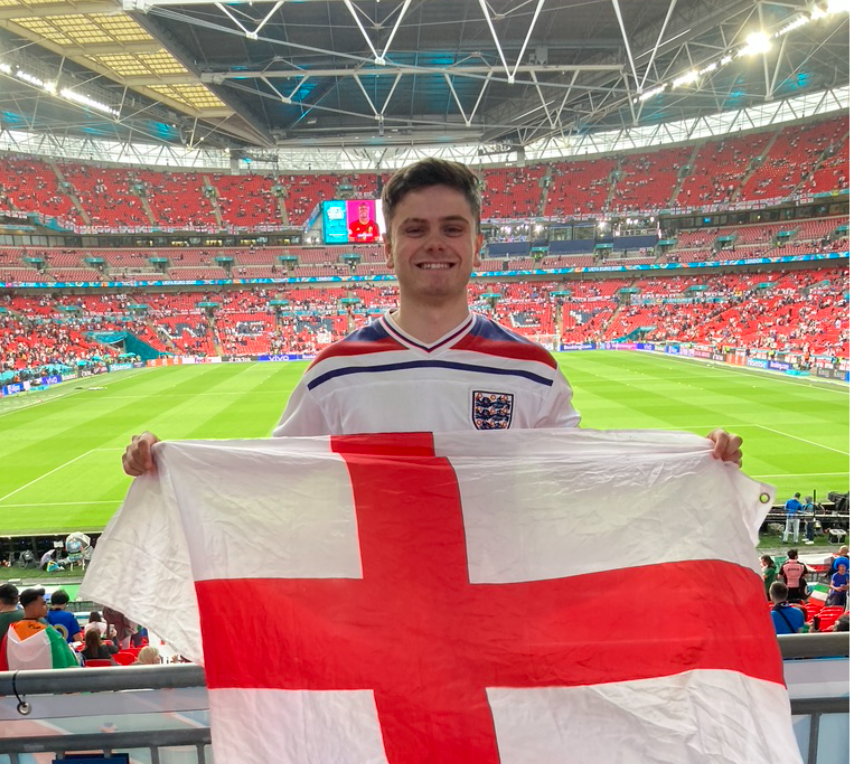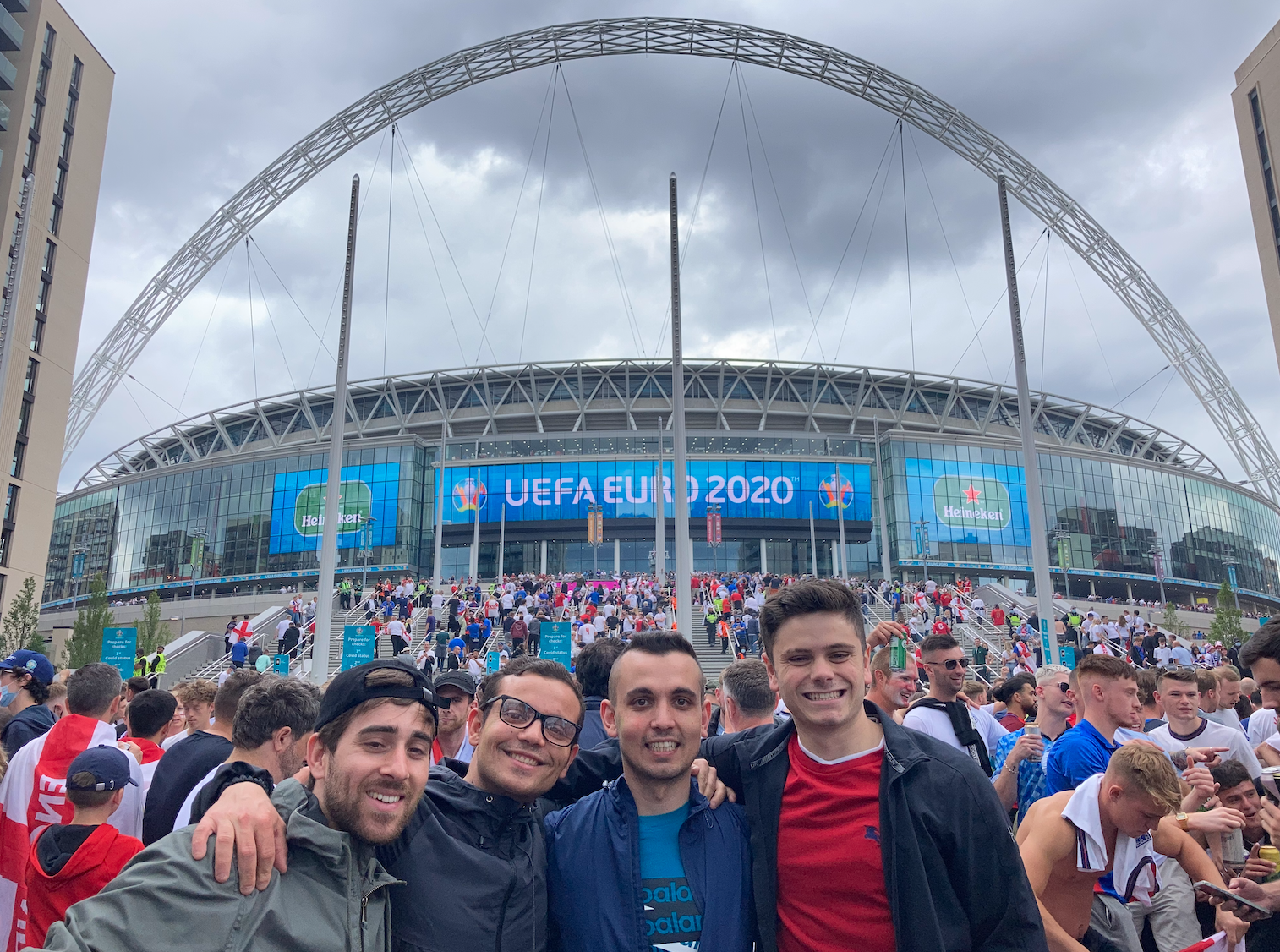Hands… touching hands… touching me… touching you- but perhaps too much touching on this overcrowded occasion at Wembley. Emotions were high before, during and after the game- but also perhaps too high when weed was being smoked and lines of cocaine were snorted everywhere inside Wembley stadium. Southgate was perhaps also not “the one” on this occasion, loading mountains of pressure on the backs of two cold U23 players coming on from the bench and on the back of a young 19 year old who had never taken a penalty in his career before. A surge of online abuse and racism from too many anonymous cowards followed, unsurprisingly and annoyingly, even though all that mosquito-like noise of abuse had been there all along. Perhaps we will never see the end of it, despite Bukayo Saka’s wistful words “love always wins”. Perhaps we will never see England win anything in football ever again, and therefore never see that racism-free, hooligan-free, drug-free, idiot-free, perfect English society which would surely, surely ensue from victory?
The first notable thing I did on Sunday 11 July 2021 was to tell fellow England supporters who had travelled from Hull to get off at Finchley Road and get on the Metropolitan Line to Wembley Park, so that all the unexciting stops on the Jubilee Line could be skipped. The group of men encircled me and gave me a loving, sweaty hug after finding out that I was right. In a tournament dominated by various miscellaneous topics such as knees, Priti Patel, bleach, Atomic Kittens, Coca-Cola bottles, that pandemic which is currently going on in the world, turnstiles, and social media, who knew what to expect? Stepping out to see the crowd down Wembley Way, well, there was no chance of you not belting out Three Lions, to the displeasure of Europeans who are (of course) jealous of our arrogance at not having won anything since 1966. COVID restrictions aside, there is nothing wrong with a carnival atmosphere down Wembley Way, like one you would see down the streets of Notting Hill. That was what I first assumed this crowd to be at first sight, and it probably was that for the best part of the 250,000+ supporters standing down Wembley Way with 5 hours to go until kick off. Today, I had hoped, was going to be England’s kind of reincarnation of Waterloo, VE Day, 1966 glory.
So, off I went to meet with some of my Italian friends (no, they did not have calzone up their arse and they won’t be doing that anytime soon). I could quickly sense their fear and anxiety when I first saw them, and I (ignorantly) couldn’t understand why. From the bridge that overlooks Wembley Way, we played a quick game of Where’s Wally?, but instead with Italian flags and blue shirts. The challenging task we set ourselves was rather unsuccessful but, nevertheless, we made our way into being engulfed by the swarm of white shirts and stench of ale and piss. It was then that I realised a few of those here were spoiling the day- throwing glass bottles about, cursing into my friends’ ears with malicious intent, unreservedly sniffing lines out in the open. For the 20 to 30 minutes walk we made from Wembley Park station to Gate 3 of Wembley, we crossed one line of police. At Stamford Bridge, on a fairly standard matchday, I’ve walked past more. The thoughts never fully crossed my head on the blaze of the day, but the reflection of it may be that I saw a few things around that I probably would be better off not seeing.
I am no expert on security, but Wembley had none of it. It was the Met Police’s worst day on record since the Sarah Everard protests- a quite shameful feat considering those horrific scenes were also this year. Yet, it might still be that something as under-funded as the Met Police were destined to be incapable of stopping gangs and hooligans from what they do best – being hooligans and gang members en masse. The main problem was likely the lack of infrastructure in place in and around Wembley. Months ago, the long, concrete ramps were removed from Wembley Way in favour of aesthetic stairs, giving any kind of fan access to be within metres of the Wembley pitch without actually possessing a ticket. At the Maracanã, for instance, you’ve got to walk through various spiralling ramps to get inside. In Porto for the Champions League final, barriers blocked off potential ticketless fans hundreds of metres from the Dragão’s entrance.
After several minutes of trying to avoid any hostile confrontation, my Italian friends and I made it to Gate 3, meeting up with a group of other alienated British Italians. I lurked by this group, myself now feeling slightly left out despite the thousands of Englishmen around, until a generous woman handed me a ciabatta sandwich. At the same time but at another entrance, a bunch of thugs were storming into Wembley, bribing stewards, stealing sponsors’ paper tickets, stampeding through entrance doors- another testament to Wembley’s faulty and penetretable security.
There has been a lot of critique and condemnation of the English “yobs” in the last week- and rightly so. However, when young people have quick and easy access to drugs and alcohol in any and every London borough, when the U.K. government can’t even follow the rules they set in the first place, when the working class are consistently frowned upon or ignored by the rest of us, when several politicians encourage the rhetoric of prejudice and abuse, when tabloids can get away with anything, when the FA is deterred from taking decisive action against the misbehaviour of fans, when UEFA price out the “common fan”, when people have had to contend with robotic fan noises after being blocked from stadiums for over a year, when Florentino Perez the burglar has been trying to rob the game away from the people, when the final at Wembley is ambiguously set at a capacity of 75% leaving thousands of seats empty for use, when England have underperformed for years upon years, you can reflect and understand that there is something at work on a much larger scale enabling for coke-head Charlie Perry to set off flares and fireworks from the crack between his bum cheeks in Leicester Square. That isn’t to deflect and clear the culpability from the individual vandals at all; rather, it’s to also hold those who make the decisions above to account for having directly or indirectly caused this behaviour, or alternatively let it happen.

Our seats were in the Italy end behind the goal. I saw a couple of other England fans, so I removed my disguise and showed my England colours. A man touched my shoulder from behind: “You’re sitting in the wrong end… but it doesn’t matter, we are all families here.” I felt slightly ashamed for occupying the space an Italian should be sitting in, despite being welcomed in by the supporters around me. The other side of Wembley, where England Supporters Club members sat, did seem much more full than what I had seen before. As Simon Kuper reflected, football security officials are more terrified by the “possibility of crushes, stampedes, another Hillsborough”. I’d been told growing up by my grandfather that over 200,000 people had gone to the Maracana to watch Brazil lose to Uruguay in the last game of the 1950 World Cup, and that several Brazilians killed themselves out of pure passion by jumping from the roofs of the stadium. These tales had once sounded like some Homeric phenomenon, some moment of extreme pathos that could only be conceived of outside reality. The threat of stampedes, as Kuper highlighted, and the threat of devastation at full time now darkened the tone of the blurry tales.
Though there was some physical violence at the end of the game, especially against Italian fans celebrating their deserved win, the violence and devastation really happened online. Rashford, Sancho and Saka were the ones racially abused by trolls; Saka said he “knew instantly” what was going to happen in the aftermath of his penalty. It doesn’t take much time to find monkey emojis and n-words commented on the various pages of black footballers, and it takes even less time to find such abuse on the comment sections of black female footballers. And it takes much, much less time for a copyrighted post to be removed by Twitter or Facebook- something that can only be deemed bizarre when the same is not being done to remove abusive messages. The unnerving side of social media is the way you can only be “verified” for being famous, or at least relevant. Racists can go about their daily business without much consequence. One compelling argument made against the verification of all social media users by Joey d’Urso from The Athletic suggested that identification could help other homophobic, racist and sexist governments monitor free speech. Such internationalised platforms require unanimous international regulation.
On the Monday afternoon after the match, one of my Italian friends messaged me “did you guys have a lovely bank holiday???” Emotions were still raw. It would be fair to say that I was fairly irritated, but the conversation that followed was some lovely old football chat. Being an England fan is full of the ‘perhaps’- perhaps we will win, perhaps I will not get caught for trespassing, perhaps I will get racially abused tonight Some things, however, are certain. I will let my friend’s Facebook post share that certainty in better words I could write, concluding this difficult article : “While everyone is highlighting the scene of violence that happened yesterday, I would point out the fantastic experience that I lived. These European games gave me the opportunity to meet hundreds of Italians that left our country for a better future for them and their family, hundreds of friends and brothers that have shared the same stories, prayed, cheered, suffered and some of them cried for our own patria. These games also give me the opportunity to meet new friends from Spain, England, Scotland, Netherlands and Brazil, which reflected the entire spirit of the European Games. Thanks all to be part of these special and unforgettable memories. Please don’t say that it is only football, this has been something more.”
